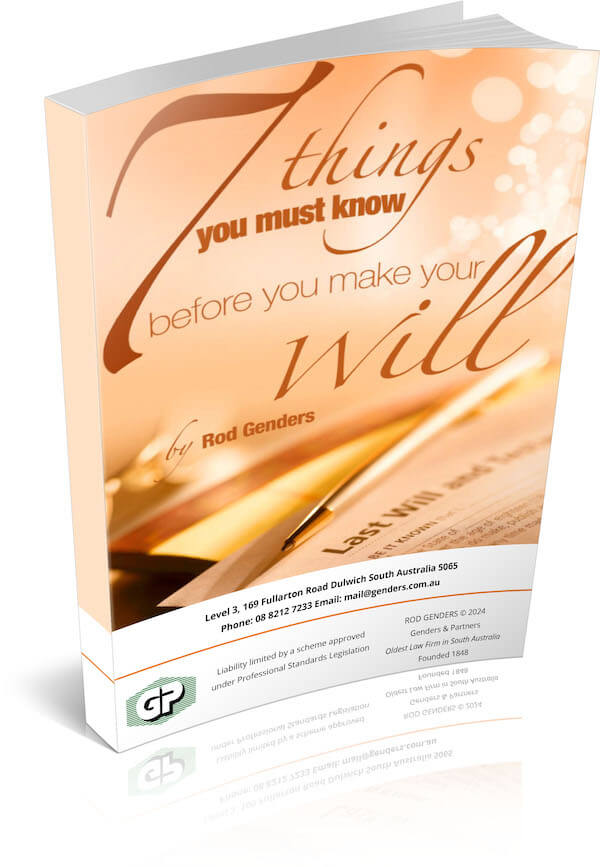 It’s not hard to find do-it-yourself Wills or Will-kits and other estate-planning materials on the Internet. But the topic is complicated, and the right solution is specific to each individual.
It’s not hard to find do-it-yourself Wills or Will-kits and other estate-planning materials on the Internet. But the topic is complicated, and the right solution is specific to each individual.
The laws vary from country to country, and even within Australia they vary from state to state. They also change over time, and the laws related to estate planning have also undergone rapid changes internationally over the past several years and are starting to change in Australia too. Further changes to the law are expected in the next few years, as Australian governments try to cope with the retirement of so many Baby Boomers.
If you’re creating or updating an estate plan, it’s essential that you seek the advice of a lawyer who’s well versed in the key issues. Not only can a specialist lawyer advise you how to ensure that your assets are properly distributed and that your health care proceeds in accordance with your wishes, but he can also do so with an eye toward protecting those assets (from creditors, bankruptcy, litigation etc).
Of course, any time you hear the word “lawyer,” it’s natural to worry about the legal costs you might incur. But the process is more affordable than people fear. You might be tempted to postpone creating an estate plan, assuming that you need to have a lot of assets to make the process worthwhile. Alternatively, there are plenty of excuses to delay this important process: waiting until after they are married, until the kids are born, until the kids are grown, until they’ve retired, until the grandkids are born etc. But everyone – regardless of life stage or the size of their estate – should think about hiring a lawyer to draft the basic estate-planning documents: a Will, an Advanced Directive, and powers of attorney.
Before you hire an estate-planning lawyer to draft or update your estate plan, it’s important to understand your role in the estate-planning process. Your estate plan will be most effective if you spend some time at the outset finding the right lawyer for your needs and thinking through what you’re trying to achieve as well as whom you trust to see your wishes through.
Don’t believe the guy down at the pub, or the lady at the hairdresser, who try to convince you that you don’t need an estate plan, or that you aren’t old enough or wealthy enough to benefit from it, or that you can do it yourself, or that the lawyer round the corner who did Uncle Fred’s divorce can do the same thing for half the price, etc.
Estate Planning is a specialised area of law, and if you pay peanuts, you’re very likely to get monkeys!
Here are the key steps to take:
1) Find a qualified SPECIALIST estate-planning lawyer.
Because your estate plan will need to be updated as the years go by and the law or your personal circumstances change, it makes sense to find a lawyer who is well-established, and won’t be “gone tomorrow”.
Start by doing some research. Visit www.genders.com.au . The premier international organisation dealing with this area of law is STEP (Society of Trust & Estate Practitioners) whose website is www.step.org . Be careful about American websites, as their laws are quite different. The web site for www.probatelawyers.com.au allows you to search for highly qualified probate & estate-planning lawyers in your area. Websites for the Law Society of your state such as www.lawsocietysa.asn.au should be able to refer you to local lawyers who specialise in this area of law.
Try asking friends and colleagues for referrals. If you have a specific situation that is likely to affect your estate plan – for example, if you’re a small-business owner or if you have a special-needs child – it’s ideal to seek referrals from other individuals who are in a similar situation.
Before you select a lawyer, it’s perfectly reasonable to conduct a basic informational interview over the phone. (If the lawyer or his staff are unwilling to answer these questions without charging you, that should be your cue to move on.)
Ask the following:
• How long have you been in legal practice?
• How long have you been practicing this type of law?
• How many estates have you settled?
• Do you have experience with situations like mine? (Blended/divorced family, business owner, special-needs child, etc.)
• How do you charge for your services? What is an estimate of the charges for my estate plan?
2) Take stock of your assets.
Before you meet with your lawyer, spend some time listing your assets and their value: your investment accounts as well as life insurance, personal assets such as your home, and your share of any businesses that you own. Also gather current information about any debts outstanding. Your estate-planning lawyer is likely to provide you with a worksheet to document your assets and liabilities, but it’s helpful to collect this information in advance.
3) Identify key individuals.
Another important aspect of estate planning is identifying the individuals you trust to ensure that your wishes are carried out once you’re gone. You’ll need individuals to fill the following key roles. (Note that the same individual can fulfil more than one role.)
Executor: A person who gathers all of your assets and makes sure that they are distributed as spelled out in your Will. This person does not necessarily have to be extremely detail-oriented or comfortable with numbers. As long as they are trustworthy, they can hire a lawyer to handle the administration for them. Many people call upon family members to serve as executors, but be aware of the substantial hidden costs of naming a trustee company as executor of your Will, which can cost the average estate thousands of dollars more than might otherwise be expected.
Enduring Power of Attorney: A person you entrust with making legal & financial decisions on your behalf. This may be if you should become disabled and unable to manage your own financial affairs, or you might just be out of the state and need somebody at home to do something for you. It’s important that this person understand your general wishes, and have some idea about your financial affairs. Your Enduring Power of Attorney should ideally be detail-oriented and adept with financial matters. You must trust them implicitly.
Medical Power of Attorney: A person you entrust with making health-care decisions on your behalf if you are disabled and unable to make them on your own. Ideally, this is a person who lives in close geographic proximity to you and who also understands your general wishes about your own health care.
Guardian: A person who would handle your affairs if you lost capacity to do so for yourself.
Trustee: Many Wills & estates contain a testamentary trust – that is a trust set up within a Will. The Trustee is the person or company whom you appoint in your Will to invest estate-assets and hold them safely for the benefit of one or more other people named in your Will (frequently children).
4) Create an integrated estate plan.
When you meet with your estate-planning lawyer, he will make recommendations about your estate plan and that, in turn, will determine which documents you need. These documents need to work together to be effective.
5) Manage your documents.
Once your estate-planning documents are drafted, destroy any older versions of them. You must also keep the documents in a safe place, preferably with the lawyer who drafted them. The downside of storing these documents in a safe-deposit box is that third parties may have difficulty accessing them in the event of your death or incapacity.
Notify your executor of the whereabouts of your estate-planning documents, and retain copies for yourself.
6) Plan to keep your plan current.
Very importantly, plan to keep your estate plan current. One of the biggest estate-planning pitfalls is setting-up an estate plan but not bothering to keep it up to date. Your personal circumstances will inevitably change over time, as will the laws affecting your estate. Try to find an estate-planning lawyer who will work with you to keep your plan up-to-date. At the very least, plan to notify your estate-planning lawyer, and possibly revise your documents, if you experience any of the following:
Change in marital or family status (for example, marriage, divorce, birth or adoption of child); Major change in assets – either sale or purchase; Major change in financial status; Death or ill health of one of your beneficiaries; Death or ill health of executor, power of attorney or guardian; Inheriting assets; involvement in litigation; bankruptcy.
Remember the old saying: An ounce of prevention is worth a pound of cure. If you don’t put these protections in place for yourself and your family now, what will it cost you/them later on when the disaster strikes?
Rod Genders is a senior Australian lawyer specialising in accident compensation and estate planning in Adelaide. His boutique specialist law firm is one of the oldest and most respected in Australia – visit it at www.genders.com.au . Rod is also a prolific author and speaker. Some of his articles and books on Wills, Probate, Trusts, Estate Planning, Asset Protection and Retirement Planning may be found at www.genders.com.au/adelaide-lawyer-blog.
SPECIAL REPORT “7 Things You Must Know Before You Make Your Will”
In this report you will Learn:

Why home-made Wills can be a LOT more expensive than you might think.
The secret weapons used by the rich & powerful to protect their assets, and transfer their wealth two or three generations ahead.
How Estate and Trustee Companies make BIG money from “free” Wills.
The Most Common Estate Planning Mistakes, how they can cost your family a fortune, and How to Avoid Them.
The Elements of a Sound Estate Plan – why a Will alone is not enough.
How to Make Sure Your Assets Stay in Your Family and are not lost to creditors, lawsuits or ex-spouses.
How to guard against challenges to your Estate after you’re gone.







